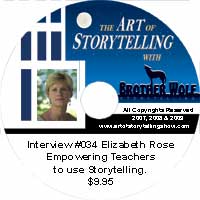Elizabeth Rose – Empowering Teachers to Use Storytelling in the Classroom:
 |
|
||||
Purchase a CD of this telephone interview…
 |
CD Telephone Quality Audio Interview #034 Elizabeth Rose – Empowering teachers to use storytelling for $9.95. [wp_eStore:product_id:19:end] |
Elizabeth Rose writes…
In this podcast I hared my ideas on how to use storytelling in the classroom in a realistic way in order to help teach the mandated state curriculum. Many of the skills that teachers are held accountable for can be taught with the use of storytelling. Children respond to stories in the narrative form. Many teachers do not believe in their own storytelling abilities. More teachers need to be empowered to test their storytelling skills with their classes; the rewards are great.
Children also have the capability of becoming great storytellers. So many skills can be learned through storytelling such as plot, sequencing, vocabulary, story structure, characterization, point of view, figurative language, listening skills, the list goes on and on and on. Elizabeth will discuss the value of having youth storytelling clubs and educating more people about the opportunities for youth storytellers, such as the National Youth Storytelling Showcase.
Bio:
Elizabeth Rose is currently the co-chair to the YES sig, which is Youth and Educators in Storytelling. This is one of the NSN special interest groups. She represent the Class part of the sig. Rachel Hedman represents the Youth portion. She is also currently the director for the National Youth Storytelling Showcase which takes place February 7 – 9 in Pigeon Forge, TN, and the NSN State Liasion for Tennessee.
Elizabeth Rose has been in education for the past 22 years, teaching grades kindergarten through 8th grade and is currently in administration. Throughout her career she has always used the power of story in her classroom no matter the age of the children. She uses storytelling as a hook, to help children see past the printed words on the page, to help children find meaning in their own writing, as a way to help children improve their oral language skills, and to simply entertain.
Elizabeth shares stories with wit, humor and expressive enthusiam. Her stories include a blend of traditional southern folklore, faity tales, ghost stories, ballads, and folktales from around the world. She has the ability to mesmerize her listeners, transporting them through her image-laden tales of other times and cultures. She has thrilled children and adults alike with her vivacious storytelling in classrooms, festivals, and conferences around the country. She is truly captivating in voice and presentation.
Some Links mentioned on the show
National Youth Storytelling Showcase on Feb 7th and 8th 2008.
http://www.nationalyouthstorytellingshowcase.org/home/
6 Comments
Other Links to this Post
RSS feed for comments on this post. TrackBack URI


By Tom McCormack, November 27, 2007 @ 6:57 pm
What a timely podast to highlight as the art-of-teaching is needed more than ever in public education today! And storytelling is the most effective vehicle.
Story is a key ingredient to awakening the will to learn in students. All forms of the story art and craft have an important application for (ASLL) Active Student learning/Listening in the classroom.
I will try to participate in the podcast program tonight (although I’m presently on tight deadlines for conference proposals).
Elizabeth will enjoy previewing the web-site of one of my friends at http://www.teacherzones.com (Paul’s new book focuses on vital information relevant to different ways teachers can approach and accomplish the education assessment standards and evaluation criteria). I’m sure she will touch on the importance of story-power for developing reading, writing, and social skills in students. Both state Dept-of-Ed”s and Federal NEA has documented that the greatest failing in public school education, is the inability of students to communicate effectively. (see: Speech/Public Speaking/Debate/ and lack of verbal communication with other students, teachers, and parents)
I have developed a Synergistic Intelligence teaching+learning model based on ethnic cultural tools applied in the classroom.
Eric, keep the progessive programs coming! PROGRAMS LIKE THIS MAKE A DIFFERENCE FOR FUTURE GENERATIONS!!
All The Best ~
Tom
By Buck P Creacy, November 28, 2007 @ 2:30 pm
Hello Eric;
Just wanted to say how much I enjoyed the conversation you had with Elizabeth Rose. I really did enjoy myself. I felt better about my first Personal Development presentation to teachers here in Kentucky and I was so pleased with the great questions you asked and the answers she gave.
Keep up the good work
Looking forward to our conversation about The Six Elements of Humor.
Buck
By Dorit, December 2, 2007 @ 9:22 am
Hello Eric!
I really wanted to thank u a lot! I love this last conversation it is the answer of all what I ask from teachers to do.
If teachers will make in every meeting with the class a story within a story within… and develop the mains subject of the lesson as if it is a story and put a little story at the end of the lesson, I am sure that children will learn to listen and the teacher will have more interest in teaching.
By Tim, February 7, 2008 @ 3:21 am
Had two thoughts listening to the conversation with Elizabeth Rose:
One is this (and once I listen to the podcast with Dianne de las Casas I’ll weigh in more):
I think the connection of storytelling to literacy is an easy sell to schools, because of the current climate of accountability and testing… but focusing on the language misses the power of storytelling to activate imagination and imagery.
Two, Eric, you mention the use of storytelling as a means to teach or model moral behavior –this in the discussion of teaching children how to be active and attentive listeners– and I agree, these are behaviors that have to be taught. But I don’t see active and attentive listening as moral behavior so much as effective survival skills, skills which would, in this day and age, could actually improve the chances of (reproductive) success.
Now if only I can find a longitudinal study somewhere that tracks students who learned active listening and see if they end up with more money, more children, happier lives, et cetera.
By Harvey Heilbrun, February 9, 2008 @ 1:15 pm
As an educator and proponent of storytelling in the classroom I found this podcast very supportive of my beliefs and wish more people in education would listen to it.
I was reminded of two things while listening. One was a program that I used while teaching called “Magic Circle” which was published by the Human Development Training Institute (I’m not sure if they still exist). It basically was a program of sharing stories every day. The teacher would bring up a topic such as, “A time something didn’t turn out right”. And children could share if they wanted to. The nice part about it was that no one was forced to share if they didn’t want to and everyone listened. At the conclusion of the sharing there would be review, “Who can tell someone else what they shared?” In the beginning you had to remind the reviewers that they were talking to the person who shared, so instead of “She shared…” students would be redirected to, “You shared…”
The effect on the classroom was amazing. Whenever you stopped doing Magic Circle, students didn’t ask for it, but there was a clear change in the behavior they exhibited to each other. Unfortunately with the amount of Standards and curriculum expected of teachers now, programs like Magic Circle have been left behind. I think finding those stories that connect to what you are teaching is part of the answer. We still need to give students the opportunity to share their stories and be heard.
The second thing I’m reminded of is when Elizabeth kept saying “Model, Model, Model”. I was reminded of a quote I heard at Confratute (A conference/institute on Gifted education run by Joe Renzulli). I believe it was Rachel MacAnallen (a famous math guru) who said, “If you’re not modeling what you are teaching, you are teaching something else.” I too get very frustrated when I’m doing a performance in a class or school and the teachers/adults are having conversations with others, or marking papers, etc. How should one handle those types of situations and still not tick off those people who would hire you to come back again? It’s the children that lose out.
By nancy uhlmsnn, April 13, 2008 @ 12:27 pm
I agree, story telling is very empowering. I have used storytelling in my classrooms for many years and did not see the many advantages until you so skillfully discussed the process. Thank you for your exciting and valuable message. I have had principals come into my classroom and remark about the total involvement and amazing listening skills the children exhibited. I did not connect the storytelling to this process, but it is indeed the reason my children are totally engrossed in the process of education. Other teachers have asked me how I achieved this and I could not explain it. I now can. Thank you for wonderful and enlightening storytelling podcast which encourages me to continue to reach the children through storytelling.